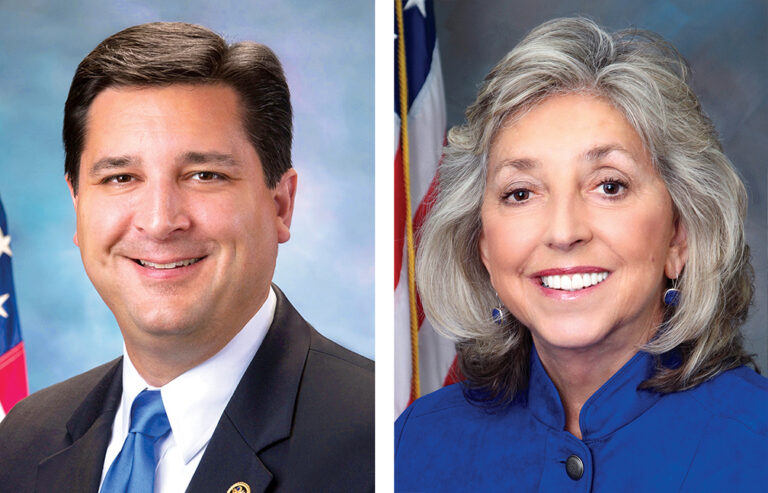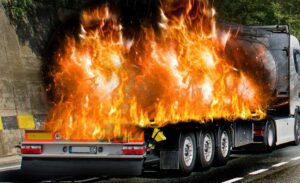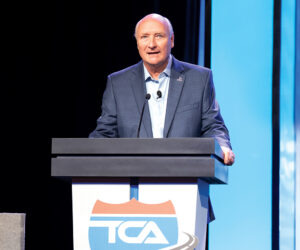To some degree, members of Congress serve as gatekeepers to a safe and successful trucking industry. They establish laws that create executive branch departments — among them, the Federal Motor Carrier Safety Administration, the National Highway Traffic Safety Administration, and the Federal Highway Administration — and they approve the men and women who lead those departments. And, of course, members of Congress pass laws that lead to the creation of rules and regulations that govern trucking.
A solid government relations program at any trade association is essential, and that’s what the Trucking Carriers Association (TCA) offers with Vice President of Government Affairs David Heller and Manager of Government Affairs Kathryn Pobre. A key component of TCA’s government affairs program has been its annual Call on Washington, initiated in 2017 as a means of meeting one-on-one with lawmakers.
“This event has been instrumental in the success of TCA’s government affairs as it places the membership directly in front of their representatives in an effort to educate our Congressional leaders on the issues that truly matter to this segment of the industry,” noted Heller.
TCA strives to hear opinions on both sides of the aisle. That’s why TCA invited Reps. David Rouzer (R-NC-7) and Dina Titus (D-NV-1) to share their views on several issues important to trucking.
Rep. David Rouzer
Republican David Rouzer has represented the seventh district of North Carolina since 2015. From 2009-2013, he was a member of the North Carolina Senate representing the 12th district. Currently, he is a member of the House Transportation and Infrastructure Committee and the House Agriculture Committee.

What is the path forward for the Senate’s bipartisan infrastructure package when it is sent back to the House, and will the House have input in the final legislative text?
We need real solutions and investments in infrastructure, and we must prioritize core infrastructure projects. Whether Congress reaches a final deal on infrastructure anytime soon remains unclear, even with Senate passage at the time of the submission of these answers on August 11.
House Republicans were ready to work together on infrastructure if the House Majority had been willing to consider any of our priorities, such as the STARTER Act 2.0 and our wastewater infrastructure bill. The STARTER Act 2.0 is a fiscally sound, long-term surface transportation reauthorization bill that provides historic levels of investment in America’s roads, bridges, and core infrastructure to meet the nation’s growing transportation needs. To ensure these resources go further, the Republican House bill gets these investments into the hands of states and localities without numerous strings attached, and it cuts red tape to get meaningful transportation improvements completed in a more timely fashion.
What are the major differences between the provisions included in the House and Senate infrastructure bills?
While the Senate infrastructure bill has more of a focus on traditional infrastructure items, House Democrats abandoned bipartisan negotiations at the outset of the process in favor of a partisan bill that prioritizes Green New Deal mandates over rebuilding America’s infrastructure. Their bill would spend $1 of every $2 on Green New Deal mandates.
The House Democrat bill is not paid for; the Senate version does a better job of using legitimate revenue sources. The spending increases in the House bill rely heavily on more deficit spending, which will cause continued inflation and increase the cost of all goods. Additionally, the House Democrat bill leaves rural America behind. It plows billions to urban centers at the expense of rural communities.
Most problematic, however, is that Speaker (Nancy) Pelosi and Senator (Chuck) Schumer are tying the infrastructure bill to a broader, partisan, multi-trillion-dollar package containing very liberal priorities using budget reconciliation, which cannot be filibustered and requires a simple majority vote. Their intent to proceed in this way likely dooms the infrastructure bill, in my opinion, but we will have to wait and see.
What are your views on the trucking-related provisions in the House bill?
A meaningful infrastructure proposal should be targeted and include responsible investments to strengthen our nation’s infrastructure. Unfortunately, the House bill is more targeted towards Green New Deal mandates than traditional infrastructure.
Fixing our deteriorating roads and bridges and investing in workforce development for the trucking industry is critically important. Key provisions of the STARTER Act 2.0 that Republicans support include: improving our roads and bridges rather than diluting limited funding with Green New Deal mandates; giving states more decision-making authority to meet their own unique infrastructure needs; and stabilizing the Highway Trust Fund, which should be devoted to road and bridge repair and construction. We obviously have to find new revenue sources for the Highway Trust Fund, given the gas tax is becoming less and less viable. So, generally speaking, I don’t have a problem with studies that identify the pros and cons of additional revenue streams. We need that information to make better policy choices.
At a time when trucking companies are struggling to find and retain workers, the Promoting Women in Trucking Workforce Act would help address this problem by investing in workforce development and supporting women who are pursuing careers in trucking. I’m also a supporter of training young workers for a career in trucking while they are in high school.
Hours-of-service requirements need to be much more flexible to meet the needs of shippers and ensure product is delivered timely. Generally speaking, I have never seen a mandate that I like. Hire the best, train them well, and let them do their job. Get the federal government out of the way.
What are your predictions for Congressional actions for the rest of 2021?
Not much. Outside of the annual appropriations bills, which will be combined as usual at the end of the year (or possibly after the first of next year), it isn’t likely that anything else of significant substance will pass. The jury is still out on a final infrastructure bill (as of the submission of this answer on August 11). One other major outstanding item is increasing the debt limit. This must be done, and if Democrats include language to increase the debt limit on any final infrastructure bill, it likely loses most, if not all, Republican support that a final negotiated bill might have. I tend to think that will be the case anyway — particularly if it is certain that a Budget Reconciliation bill is coupled with it as stated previously.
Rep. Dina Titus
Since 2013, Democrat Dina Titus has represented the first district of the State of Nevada in the U.S. House of Representatives. From 2009-2011, she served in the House as the third district representative. She was a member of the Nevada State Senate from the seventh district from 1988-2008. Currently, Rep. Titus is a member of the House Transportation and Infrastructure Committee, the Foreign Affairs Committee, and the Homeland Security Committee.

What is the path forward for the Senate’s bipartisan infrastructure package when it is sent back to the House, and will the House have input in the final legislative text?
As a senior member of the House Committee on Transportation and Infrastructure, I am proud of the work done by the Committee in developing the INVEST in America Act. This truly transformative, multi-year surface transportation bill would not only make historic investments in our nation’s transportation infrastructure, but takes critical action on climate change.
Whether the House decides to amend the Senate bill further or we engage in a more formal conference process, I believe that many of the policies of the INVEST in America Act should be enacted moving forward.
What are the major differences between the provisions included in the House and Senate infrastructure bills?
Both efforts make historic investments in our roads, bridges, transit systems, and railroads, but the Senate bill does not include many policy reforms in the House-passed INVEST in America Act that I believe are important to addressing climate change and improving safety on our nation’s highways and transportation systems. This includes some of the work I have done to prioritize projects of regional and national significance, including the development of Interstate 11 between Las Vegas and Phoenix, the only neighboring major metropolitan areas not connected by an interstate. Additionally, the INVEST in America Act contains far more funding to help electrify our transportation network and address the largest source of carbon emissions, the transportation sector.
What are your views on the trucking-related provisions in the House bill?
Investing in a New Vision for the Environment and Surface Transportation in America Act, or the INVEST in America Act, includes critical reforms that are vital for the movement of freight in this nation and will improve both efficient movement and safety for all road users.
For a district like mine, in the heart of the Las Vegas Valley, we import nearly everything, from live lobsters to fresh cut flowers. That makes the movement of freight vital to our economic success. The INVEST in America Act addresses safety needs while supporting the long-term success of the trucking industry, including diversification of the trucking workforce to better reflect our nation. With passage of a multi-year surface transportation bill, it is important that we make progress on the future of a user-fee based system to keep the Highway Trust Fund solvent. That is why I support the efforts to study regional, multi-state vehicle miles traveled programs. Lastly, I am glad that the INVEST in America Act does not include efforts to increase truck size and weight, putting further strains on our crumbling infrastructure and increasing the risk to truck drivers and others on the roads.
What are your predictions for Congressional actions for the rest of 2021?
The Senate is next turning its attention to a budget resolution. I support this effort and hope this will address many deficiencies and challenges that continue to face our nation and its people, including the need for comprehensive immigration reform and advancing movement to a clean energy economy. Additionally, Congress will need to come together to pass our annual appropriations bills to fund the federal government for the next fiscal year.
Lyndon Finney’s publishing career spans over 55 years beginning with a reporter position with the Southwest Times Record in Fort Smith, Arkansas, in 1965. Since then he’s been a newspaper editor at the Southwest Times Record, served five years as assistant managing editor of the Arkansas Democrat-Gazette in Little Rock and from November 2004 through December 2019 served as editor of The Trucker. Between newspaper jobs he spent 14 years as director of communications at Baptist Health, Arkansas’ largest healthcare system. In addition to his publishing career he served for 46 years as organist at Little Rock’s largest Baptist church.











